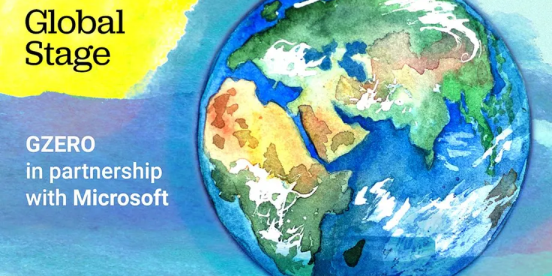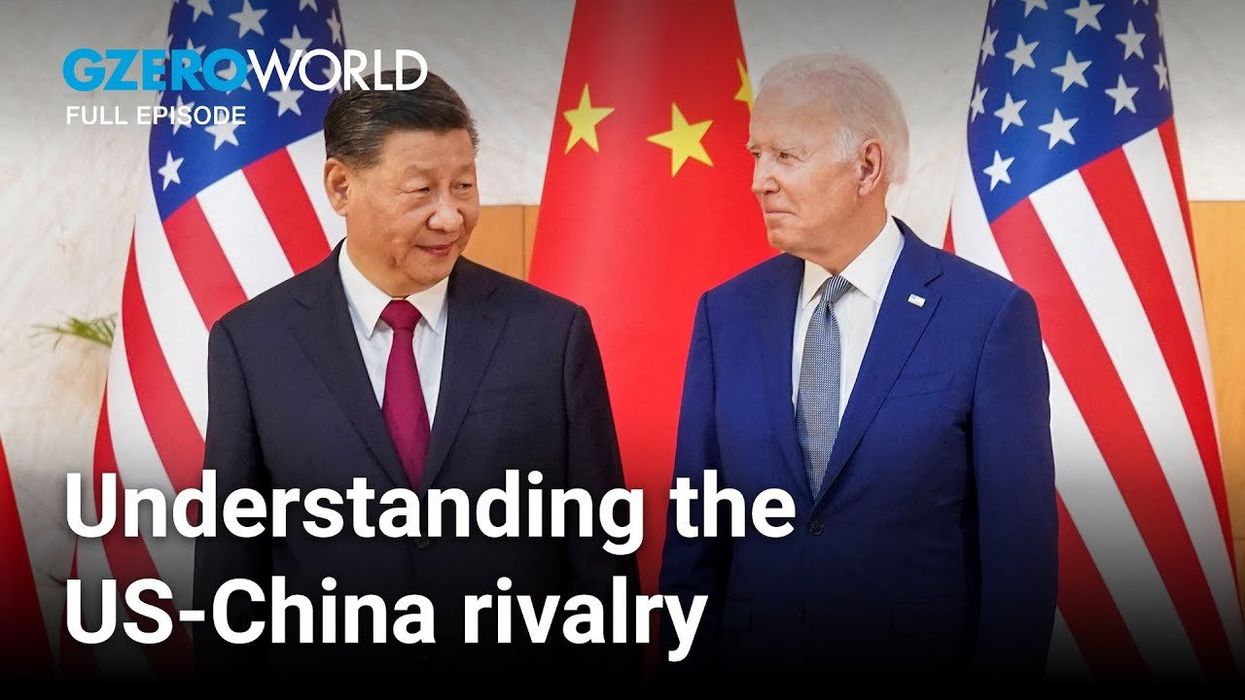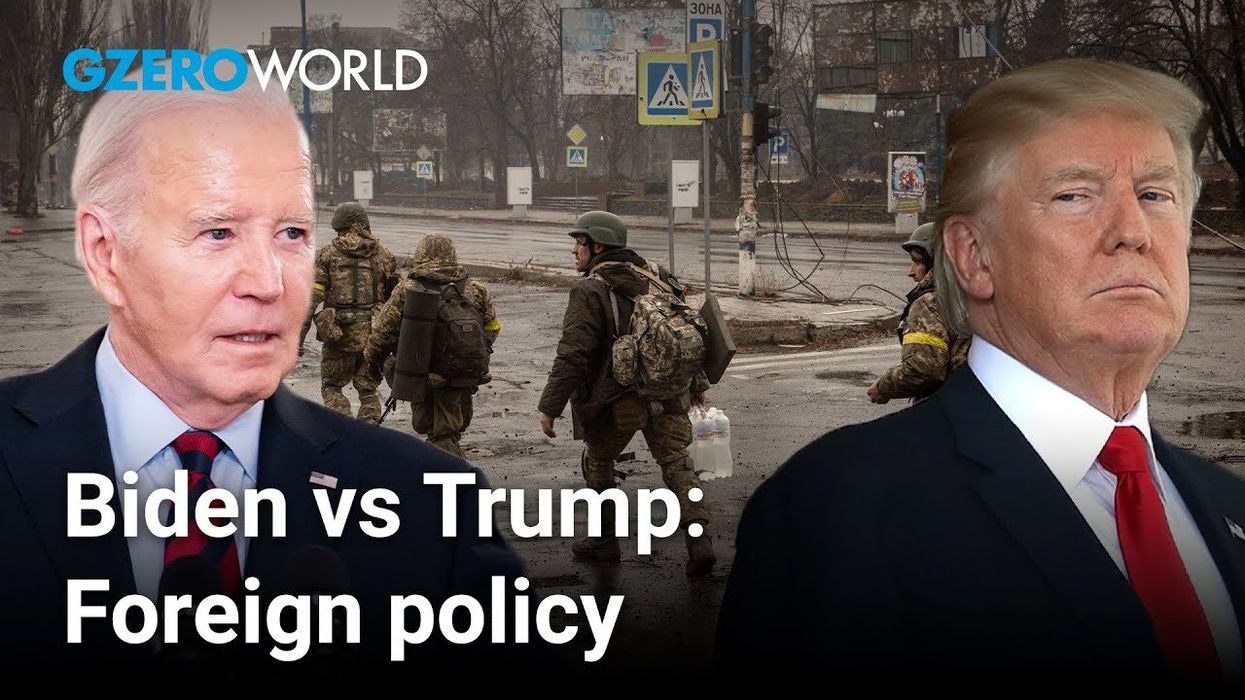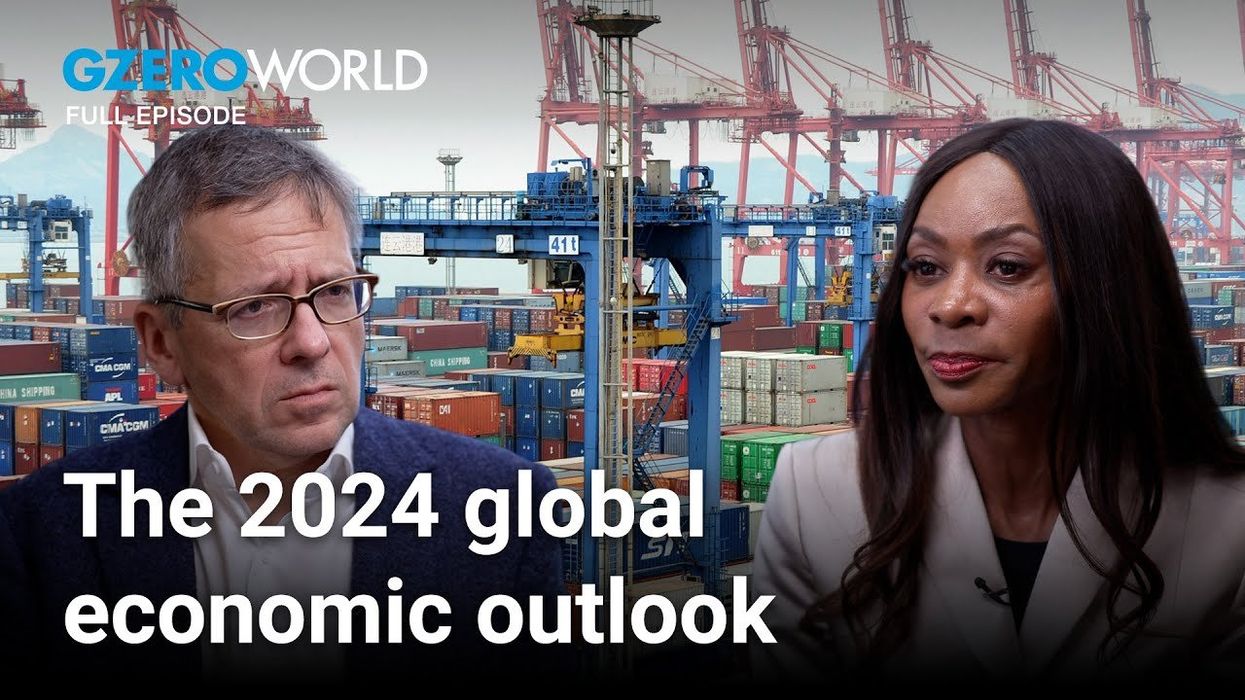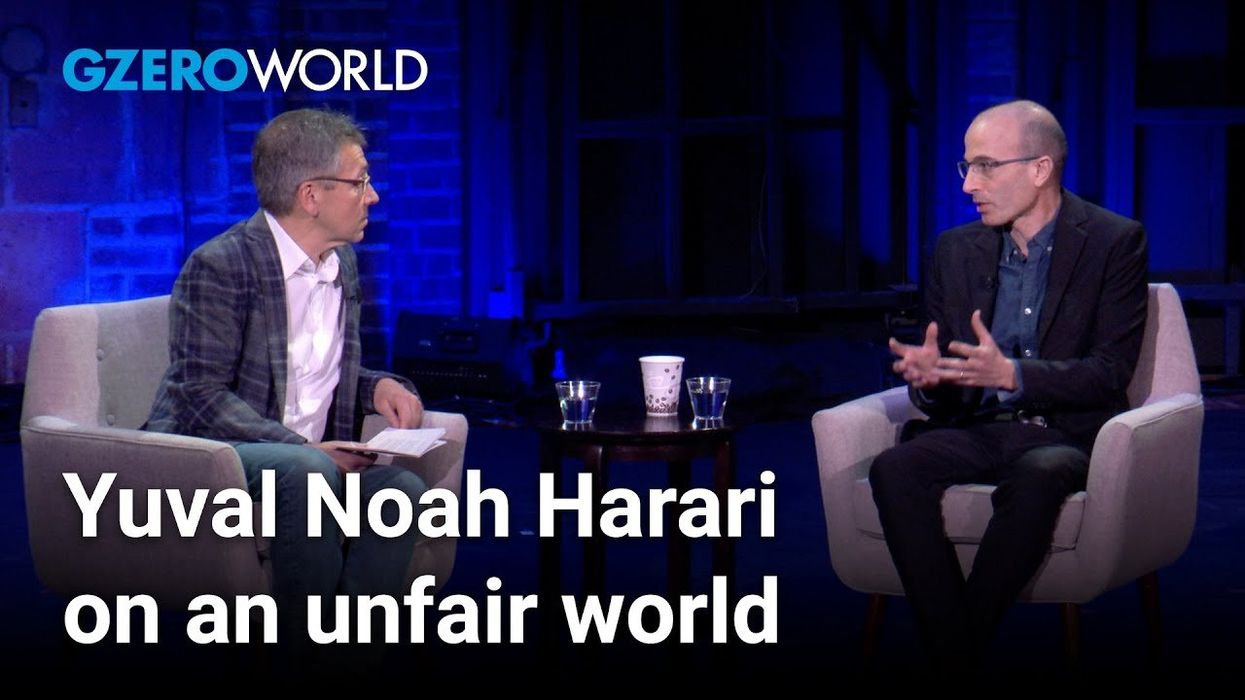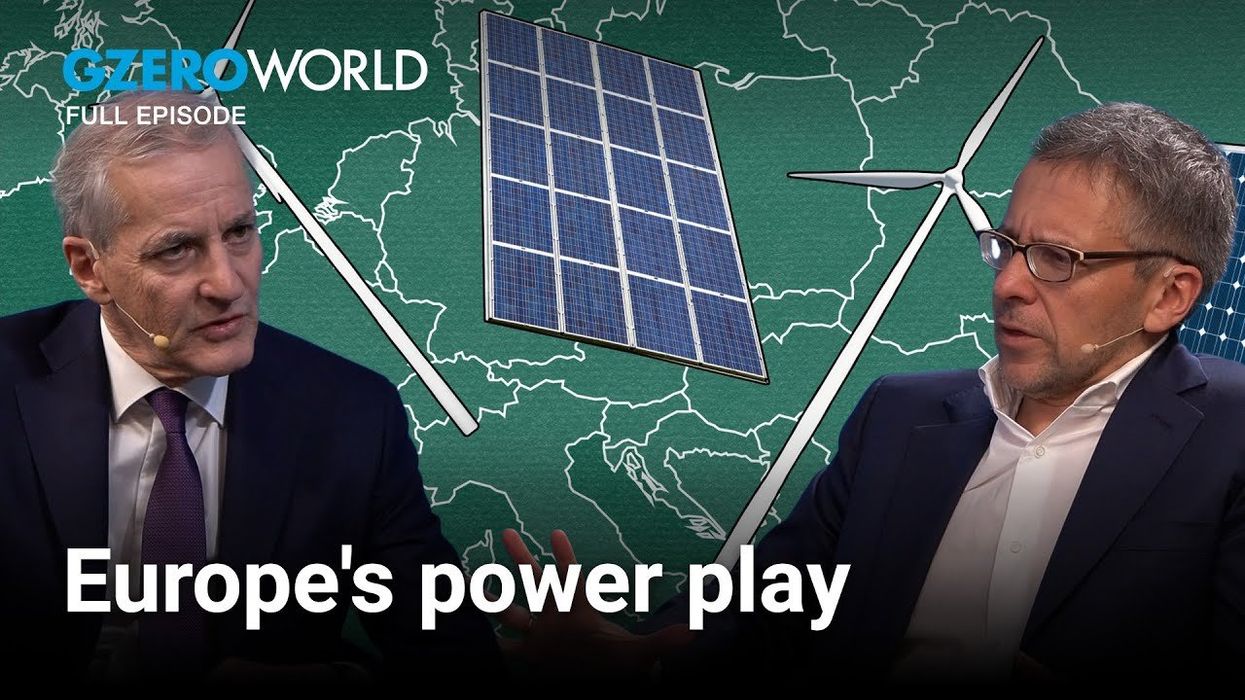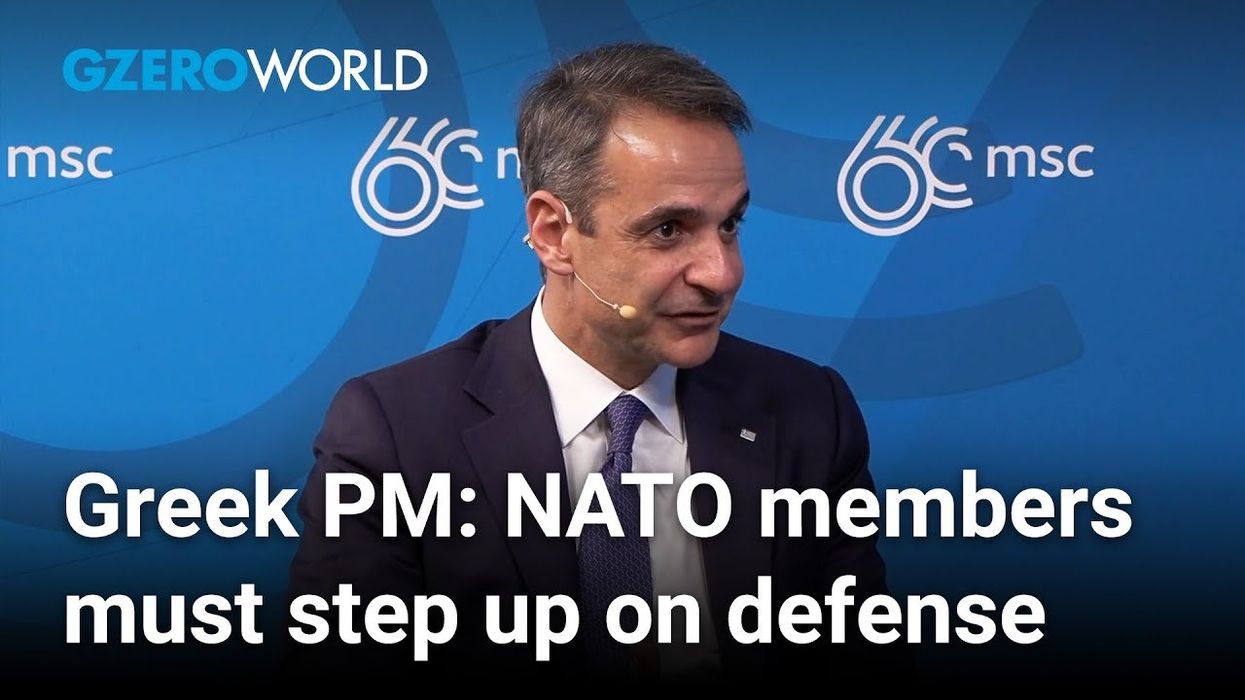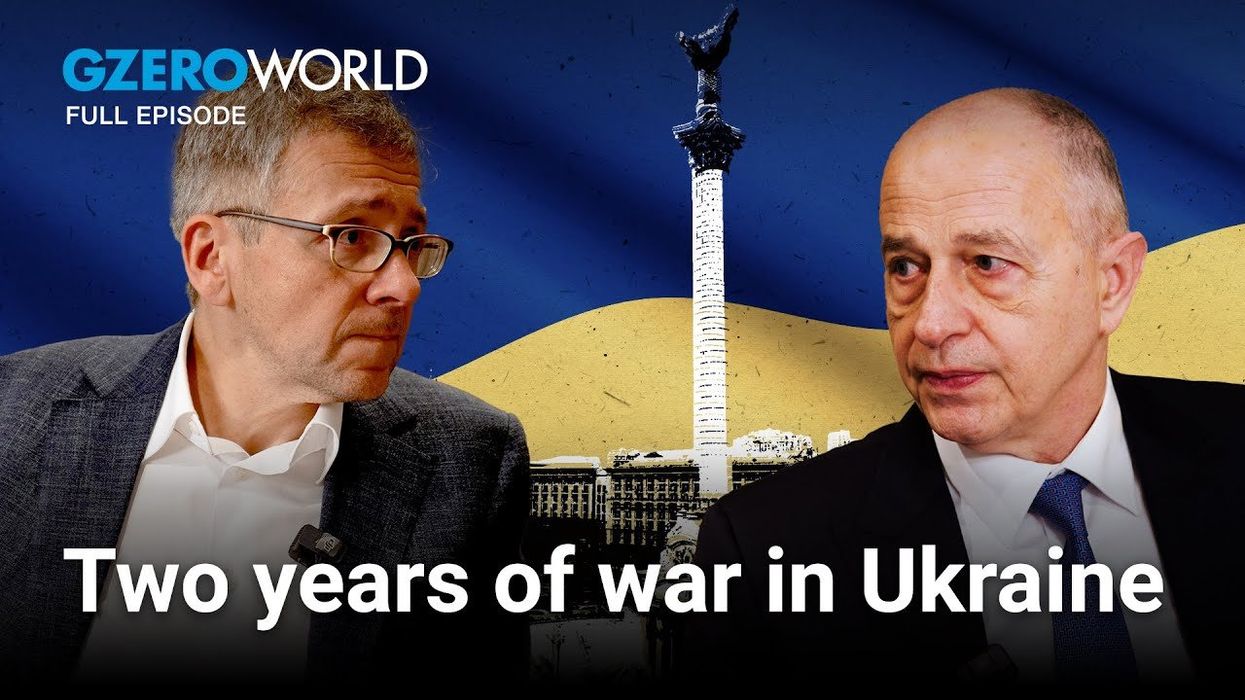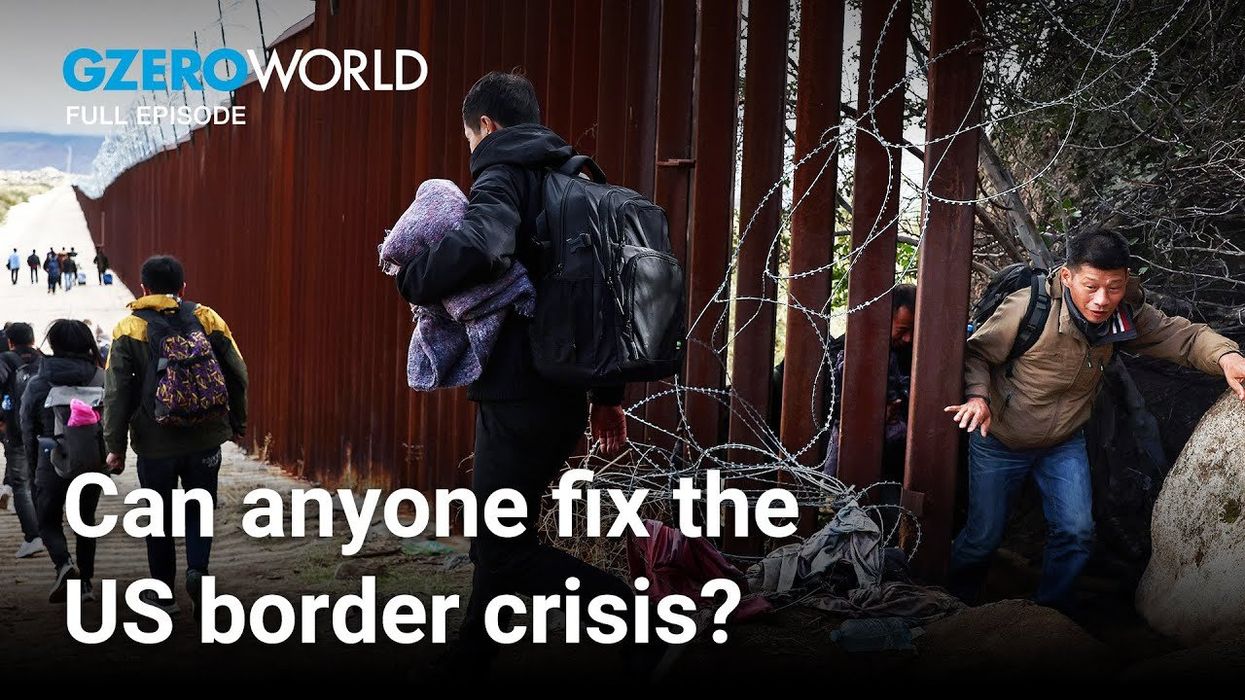We have updated our Privacy Policy and Terms of Use for Eurasia Group and its affiliates, including GZERO Media, to clarify the types of data we collect, how we collect it, how we use data and with whom we share data. By using our website you consent to our Terms and Conditions and Privacy Policy, including the transfer of your personal data to the United States from your country of residence, and our use of cookies described in our Cookie Policy.
Where the US & China agree - and where they don't
“This is largely a competitive relationship,” Burns tells Bremmer. It’ll likely be a systemic rivalry well into the 2030s between the two largest economies in the world and the two strongest militaries in the world, so what happens here is very consequential.”
Catch GZERO World with Ian Bremmer every week on US public television (check local listings) and online.
Latest Episodes
How the Israel-Gaza war could end - if Netanyahu wants it to
How close is the Gaza war to ending? “Nowhere” says Pulitzer-prize winning author and New York Times columnist Thomas L. Friedman. In a wide-ranging interview with Ian Bremmer on GZERO World, Friedman games out a possible resolution to the war (as far-fetched as it may seem right now) and explains why both Israeli Prime Minister Netanyahu and Hamas are obstacles to peace. Key to understanding this, Friedman says, is grasping the “codependency” that Netanyahu and Hamas share.
"Netanyahu always understood that... having a strong Hamas in Gaza is the best way to ensure a weak Palestinian Authority in the West Bank.” And even if he wanted to find a peaceful resolution to the conflict, Friedman explains, Netanyahu is paralyzed to do so because of his own precarious political position. “He is hostage to a Far Right in his coalition that has told him... progress toward a unified Palestinian position is a no-go, we'll throw you out of power."
Friedman and Ian also talk about how the US-Israel relationship is as tense as it has ever been. As Ian explains early in the episode, “The Biden administration is losing patience with its closest ally in the Middle East." And yet, the flow of weaponry and money to Jerusalem from Washington remains unabated. It's clear that the path to peace remains elusive. The voices of moderation and diplomacy are more critical than ever, Friedman says. But in the meantime, all signs point to more bloodshed and a new generation of Israelis and Palestinians who will grow up hating each other.
Catch GZERO World with Ian Bremmer every week on US public television (check local listings) and online.
How the US election will change the world
What role will foreign policy play in the upcoming US presidential election? “More than it usually does,” says Harvard Kennedy School’s Stephen Walt in an interview on GZERO World with Ian Bremmer. “Partly because the economy doesn't seem to be helping Biden as much as it should be, partly because it's hard to look at Biden's foreign policy and tout a lot of big success stories."
In a wide-ranging interview comparing US foreign policy under a second Biden or Trump term, Walt suggests that they may not be as different as people expect. “On a bunch of big issues, the daylight between him and Biden just isn't that great.” It may come as little surprise that Bremmer disagrees.
But Walt says this is especially true in areas like China policy, where Biden's approach has been refined and continued. "The Biden people refined the Trump approach in a number of ways—focused it very much on high-tech—but have if anything, doubled down on the policies that Trump adopted starting in 2017."
And while Walt certainly acknowledges an array of crucial differences between Trump and Biden, he argues that both second administrations may have similar outcomes in areas like the Middle East and Ukraine. That said, he makes clear that while Trump's second term may not drastically change US foreign policy, it could lead to a less supportive stance towards Europe and NATO. "Trump is fundamentally a nationalist, fundamentally a unilateralist, whereas Biden is very much a globalist or internationalist, and that's a key difference.”
Catch GZERO World with Ian Bremmer every week at gzeromedia.com/gzeroworld or on US public television. Check local listings.
Is the global economy finally on the right track?
How’s the global economy doing… really? When it comes to the world’s post-COVID recovery, it’s a tale of two economies: the United States and everyone else. On GZERO World, Ian Bremmer sits down with economist and author Dambisa Moyo for a hard look at the health of the world’s finances and the impact of geopolitical crises in Europe and the Middle East on trade flows and inflation.
Right now, US indicators are strong, but Germany and the UK are slipping into mild recessions, and China’s collapsing real estate sector, local government debt, and exodus of foreign investment is dragging the world’s second-largest economy into stagnation. Not to mention, Global South countries are holding record amounts of debt. So what does it all mean moving forward? Is the global economy still shaking off its post-Covid hangover or are some of these problems more entrenched?
“We need to be growing at 3% per year in order to double per capita incomes in a generation which is 25 years,” Moyo says, “Most of the global south is growing below that number, materially.”
Ian Bremmer and Dambisa Moyo unpack the confusing state of the global economy, China’s economic woes, and where they see the biggest potential for growth in developing economies during the next decade.
Catch GZERO World with Ian Bremmer every week at gzeromedia.com/gzeroworld or on US public television. Check local listings.
Yuval Noah Harari explains why the world isn't fair (but could be)
In a wide-ranging conversation with Ian Bremmer, filmed live at the historic 92nd Street Y in NYC, bestselling author Yuval Noah Harari delves into the foundational role of storytelling in human civilization, the existential challenges posed by artificial intelligence, the geopolitical implications of the Ukraine war, and the most pressing questions of the Israeli-Palestinian conflict. Harari argues that unlike other species, humans have thrived on their unique ability to construct and believe in shared stories, which has underpinned the formation of societies, governments, and laws. However, this same capability has led to wars, inequality, and exploitation. “Humans don't fight over territory and food,” Harari tells Bremmer. They fight over imaginary stories in their minds."
Harari and Ian discuss the current global crises, including the wars in Ukraine and Gaza, as moments where humanity's collaborative superpower appears to falter. On the Ukraine war, he says that the implications of a Russian victory would spell the end of the global order as we know it. "We could already be in the midst of World War III that started on the 24th of February 2022 with the Russian invasion of Ukraine and we just don't know it yet."
They discuss AI's emerging role in creating and disseminating stories, which represents a new frontier. Harari warns that AI could eventually dominate the world's narratives, making democracy untenable and posing unprecedented challenges to both autocracies and democracies alike. "For the first time in history, we are losing power as a species at a very rapid pace, and similarly, we are also losing control of the stories that we believe."
He also specifically addresses the critical situation in Israel, criticizing government attempts to undermine democratic institutions and pointing to an ideological battle that risks altering the essence of Judaism and Israeli identity. Harari also stresses the importance of reconciling support for Palestinian rights with the defense of Israel's existence, challenging the narrative that these positions are inherently contradictory.
Catch GZERO World with Ian Bremmer every week online and on US public television. Check local listings.
Solving Europe's energy crisis with Norway's power
Europe's energy security hinges on Norway and its transition from fossil fuels to renewable sources. That has big geopolitical implications for Ukraine and NATO.
On GZERO World, Ian Bremmer delves into Europe's urgent quest for energy independence and the broader geopolitical shifts that could redefine the continent's future. With the specter of reduced US support for Ukraine after November’s election, Europe's resilience, particularly in energy security and military capabilities, takes center stage. Norwegian Prime Minister Jonas Støre joins Ian to discuss Norway's critical role in this transition, emphasizing the need for a swift move from oil and gas to renewables, a monumental task that Europe and Norway are determined to undertake in a remarkably short timeframe. “Norway will transition out of oil and gas. When we pass 2030, there will be declining production, and then we want to see renewables transition upwards,” Prime Minister Jonas Støre tells Ian.
Their conversation delves into the ramifications of the US election outcome on NATO and Ukraine, underscoring Europe's precarious position should American support wane. The discussion reveals the continent's vulnerability to fuel crises and the imperative for a robust energy strategy that lessens dependency on external forces, notably by severing ties with Russian fossil fuels in response to the invasion of Ukraine. “Europe's ability to assist Kyiv on the battlefield will hinge not just on military capabilities but also Europe's own energy security,” Ian explains.
This is a moment of transformation for Europe as it navigates the complexities of energy transition and geopolitical uncertainties, highlighting the interconnectedness of sustainability, security, and solidarity in facing the challenges of the 21st century.
Catch GZERO World with Ian Bremmer every week online and on US public television. Check local listings.
Greece's PM on NATO, Navalny, and the wake-up call to Europe
Greece, the world’s oldest democracy, is undergoing a major digital, economic, and social transformation era. Ian Bremmer sat down with Greek Prime Minister Kyriakos Mitsotakis on the sidelines of the Munich Security Conference to discuss global security, the threat of AI in elections, and Greece’s landmark ruling allowing same-sex couples to marry.
With the two-year anniversary of Russia’s invasion of Ukraine looming large, Mitsotakis stressed the importance of continuing to send financial and military aid to Kyiv and for Europe to increase its own defense spending. NATO allies have committed to spending at least 2% of their GDP on defense, but only 18 of the 31 NATO countries currently meet this goal. Mitsotakis says it’s high time for all NATO countries to step up.“We do our part as Greece, we spend more than 3% of our GDP on defense,” Kyriakos emphasized, “Just taking a look at what's happening in Ukraine, we cannot afford the same risks.”
Kyriakos also explains why it was important for Greece to participate in the unveiling of a major new tech accord aimed at combating AI-generated election misinformation at the conference and why his center-right government pushed hard to pass the recent landmark LGBTQ+ rights bill granting marital and adoption rights to same-sex couples.Watch full episode here: Can Ukraine win the war?
Catch GZERO World with Ian Bremmer every week online and on US public television. Check local listings.
Can Ukraine win the war?
Are NATO allies as united in their support for Kyiv as they were when Russia began its invasion of Ukraine two years ago? That was the question at the top of everyone’s minds at the Munich Security Conference, where world leaders gathered to discuss the biggest challenges to global security. On GZERO World, Ian Bremmer sat down with Deputy Secretary General Mirceǎ Geoana on the sidelines of Munich to discuss the ongoing war in Ukraine and what the conflict means for the future of the NATO alliance.
“Ukraine is more than Ukraine, and Ukraine is more than European security,” Geoanǎ explains, “Ukraine is an indicator of the willingness and the capacity of the West to be able to cope with challenges coming from China or anywhere else.”
Geoanǎ also called the recent death of Alexei Navalny a “wake-up call” for the West and challenged President Trump’s recent comments about allowing Russia to invade NATO countries that don’t meet the target of spending 2% of GDP on defense. While he admits Europe could do better, he points out that NATO allies are well above the 2% target on aggregate due to heightened security concerns in former Soviet countries and the Baltics.
“In the end, this alliance, [which will celebrate] 75 years in the next few weeks, will be as indispensable to America and to all of us like it’s been since the inception,” Geoanǎ says.
Catch GZERO World with Ian Bremmer every week online and on US public television. Check local listings.
The US border crisis at a tipping point
How do you solve a problem like the US southern border? If that question makes you hum a certain Sound of Music song, just know that it's more pleasant than whatever has been floating through the minds of the hundreds of members of the US Congress. Because if there was ever a week of dysfunction on Capitol Hill, this was it. Congress failed to advance, or even entertain, a bipartisan US border deal, which also included much-needed funding to Ukraine. Why? Because of a man who is not even in government now, but very well might be back again soon: Former President Donald Trump. To unpack why the border crisis is getting worse instead of better, Ian Bremmer speaks with lawmakers on opposing sides of the aisle in Capitol Hill.
"We have an urgent need for funding for Ukraine," California Democratic Congresswoman Zoe Lofgren says in an interview for GZERO World.. "I mean, urgent...I look at some of my colleagues, and it's like the communist wing of the Republican party. They're ditching Taiwan to China, ditching Ukraine to the Russians. I mean, it's really unbelievable."
Republican Congresswoman and Ukrainian immigrant Victoria Spartz, however, defended why she wouldn't support a border deal in the current form. "I don't think that this piece of legislation really addresses the important issues and strategies that we have to deal with. I don't think it's really addresses in our border situation. It's just kind of lipstick on a pig."
Catch GZERO World with Ian Bremmer every week online and on US public television. Check local listings.
More Episodes
How AI is changing the world of work
Generative AI tools will transform our working lives, but will those changes be good or bad? On this episode of GZERO World, Ian Bremmer sat down with tech expert Azeem Azhar and organizational psychologist Adam Grant on the sidelines of the World Economic Forum in Davos, Switzerland, to answer these questions and more.
Al Gore on US elections & climate change
On GZERO World,Ian Bremmer sits down with former Vice President Al Gore—to get his take on the current state of American politics and the work he is now best known for—climate action.
The identity politics trap
Despite good intentions from the left, does focusing on identity politics hurt our society more than it helps? On GZERO World with Ian Bremmer, political scientist and author Yascha Mounk weighs in on identity, politics, and how those two combine to create the complicated, contentious idea of “identity politics.”
Divided we fall: Democracy at risk in the US
2024 is gearing up to be a pivotal year for global democracy, with elections testing authoritarian appeal, particularly in the United States. On this episode of GZERO World with Ian Bremmer, renowned Stanford political scientist Francis Fukuyama discusses the global and domestic threats to democracy this year.
